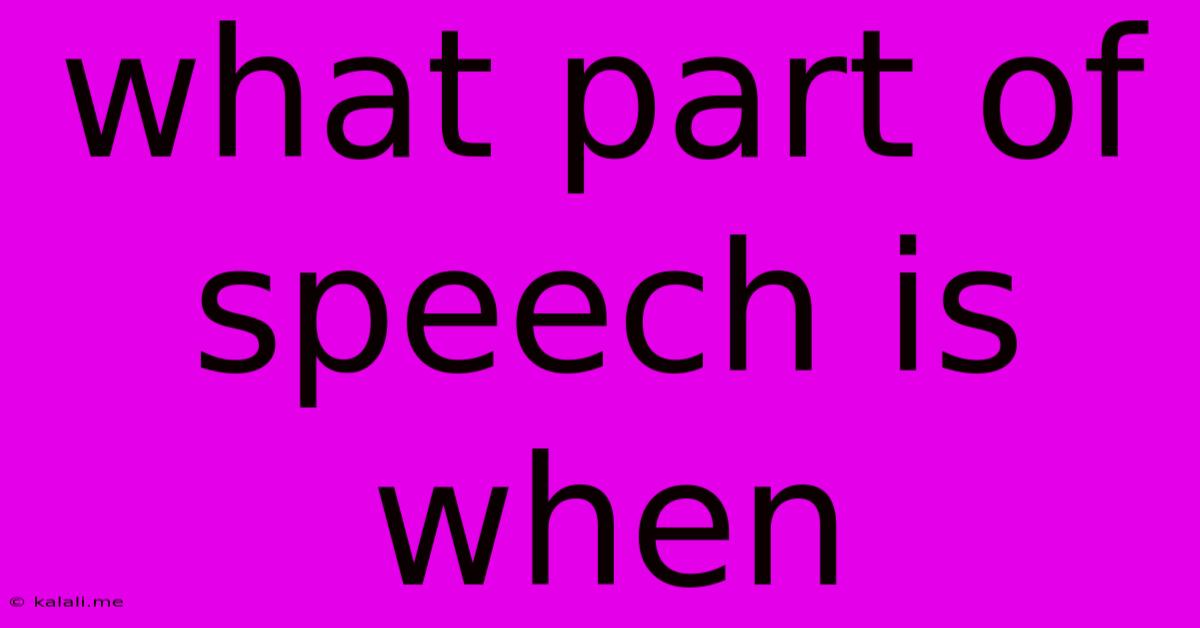What Part Of Speech Is When
Kalali
Jun 10, 2025 · 3 min read

Table of Contents
What Part of Speech Is "When"?
The word "when" is a tricky one, as its grammatical function isn't always immediately obvious. It's primarily a subordinating conjunction, but it can also act as an adverb and, less commonly, as a pronoun. Understanding its different roles is crucial for mastering its usage and improving your writing. This article will delve into each of these functions, providing clear examples and explanations to solidify your understanding.
Meta Description: Explore the multifaceted grammatical function of "when," understanding its roles as a subordinating conjunction, adverb, and pronoun with illustrative examples. Learn to use "when" correctly in your writing.
When as a Subordinating Conjunction
This is the most frequent role "when" plays. As a subordinating conjunction, "when" introduces a dependent clause – a clause that cannot stand alone as a complete sentence. This dependent clause modifies the main clause, providing information about time.
-
Definition: A subordinating conjunction joins a dependent clause to an independent clause, showing the relationship between them. In the case of "when," that relationship is temporal.
-
Examples:
- When the bell rings, the students will leave the classroom. (Here, "when the bell rings" is the dependent clause, and "the students will leave the classroom" is the independent clause.)
- I always feel happy when I see my friends.
- She knew when to speak and when to listen. (Note the use of "when" twice in a single sentence, each time introducing a temporal clause)
- The party started when the sun went down.
When as an Adverb
In certain contexts, "when" functions as an adverb, modifying a verb or an entire clause. As an adverb, it asks or answers the question "when?" or "at what time?"
-
Definition: An adverb modifies a verb, adjective, or another adverb, providing more information about time, place, manner, or degree.
-
Examples:
- When are you leaving? (Here, "when" modifies the verb "are leaving.")
- The project is due when? (Here it is clarifying the timing of a noun phrase 'the project is due')
- I'll call you later, but I don't know precisely when. (Here, "when" modifies "later")
When as a Pronoun
This is the rarest usage of "when." "When" can act as a pronoun, referring to a specific point in time already mentioned. This usage is often found in more formal or literary writing.
-
Definition: A pronoun replaces a noun or noun phrase to avoid repetition.
-
Examples:
- The precise moment of the earthquake is unknown; yet it was at when they would be most vulnerable. (Referring back to an unspecified time implied earlier)
- I have forgotten when it was that he first saw the book, which had been so instrumental in shaping his life.
Distinguishing Between the Uses of "When"
The context in which "when" is used determines its grammatical function. If it introduces a clause that can't stand alone as a complete sentence, it is a subordinating conjunction. If it modifies a verb or clause, acting as a question of time, it is an adverb. If it refers back to a previously mentioned point in time, it is functioning as a pronoun.
By understanding these different roles, you can use "when" correctly and effectively in your writing, enhancing the clarity and precision of your sentences. Paying close attention to the grammatical structure of your sentences will help you distinguish between these functions and write with more accuracy. Improving your grammatical understanding allows for stronger and more nuanced communication.
Latest Posts
Latest Posts
-
How Long Do Dried Chiles Last
Jun 10, 2025
-
How To Remove Kwikset Door Lever
Jun 10, 2025
-
How To Stop Masterburate Forever Permanently Islam
Jun 10, 2025
-
Can You Get A Bell Peper From A Chili Seed
Jun 10, 2025
-
What Is Paradise In The Bible
Jun 10, 2025
Related Post
Thank you for visiting our website which covers about What Part Of Speech Is When . We hope the information provided has been useful to you. Feel free to contact us if you have any questions or need further assistance. See you next time and don't miss to bookmark.